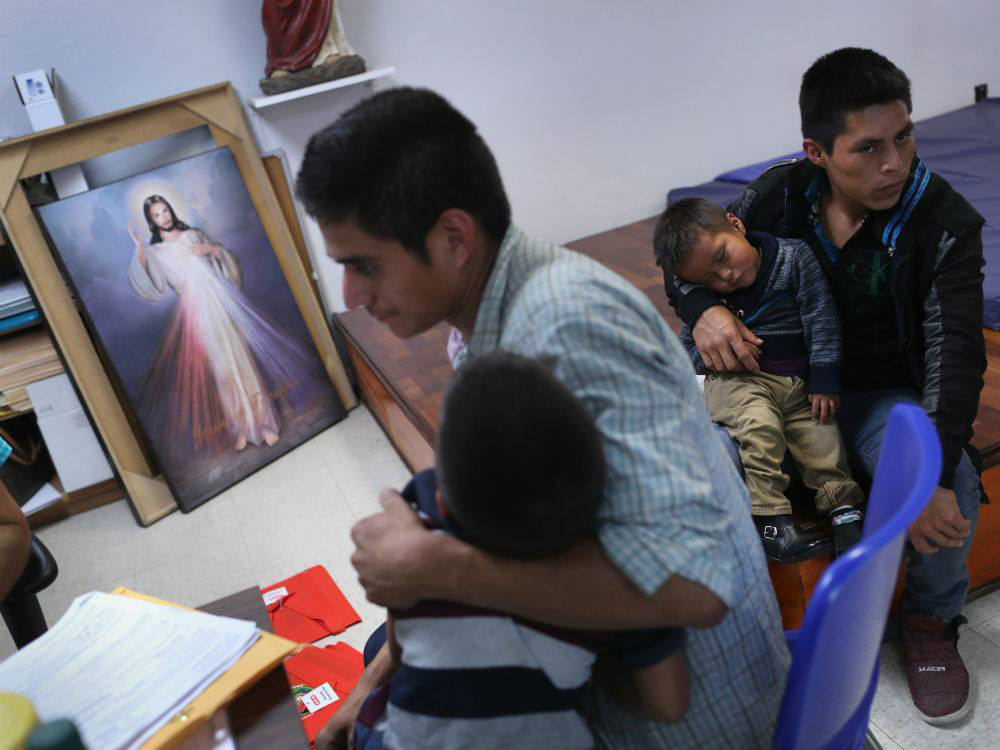
Over the past few weeks, the Trump administration has been under fire from opponents and allies following the images and sounds of more than 2,000 young children who were separated from their parents and being kept in cages in a detention center in Texas. Yesterday, President Trump signed an executive order that ends the policy of separating migrant children from their parents who are detained.
“So, we’re going to have strong—very strong borders,” Trump said. “But we’re going to keep the families together. I didn’t like the sight, or the feeling of families being separated.”
These comments come after he earlier argued that “you can’t do it by executive order.” The President is now ordering that family separation will be replaced with the detention of entire families. It’s not immediately clear what will happen to the detained children or when they will be reunited with their parents.
Since May 24, when the “zero-tolerance” policy was enforced, there have been dozens of immigrant children from Guatemala, El Salvador, and Honduras in Maryland that were separated from their families after crossing the border into America illegally. While the President’s order will stop the future separation of child and parent, local organizations are concerned about the well-being of the children already separated. The Lutheran Immigration and Refugee Service (LIRS) that works with refugees and migrants openly opposes the practice of family detention.
“While children will no longer be ripped from the arms of their parents for the sole purpose of deterring immigration, they will go to jail with their parents,” said Kay Bellor, VP for programs at LIRS, in a statement. “Jail is never an appropriate place for a child.”
For the past two years, the Catholic Charities of Maryland’s Esperanza Center has been running a family reunification program that helps minors reunite with their families. The center has helped 243 unaccompanied minors who have crossed the border—including eight who were forcibly separated from their parents—so far this year.
“We haven’t received any guidance from the [Trump] administration for how they are going to handle the children who have already been separated,” said Helany Sinkler, who runs the reunification program. “Although the children are being cared for and looked after in the shelter, there’s nothing better than reuniting a child with their family.”
Sinkler says that the reunification process is not an easy one and predicting how long it takes is tougher. Locating and approving a sponsor is a tedious process including finger printing, background checks, and myriad communication across borders given that most children arrive with nothing but a name and phone number for a relative. During that time, the child is placed in either a shelter or foster care, depending on the age, until a legal sponsor is appointed.
The American Academy of Pediatrics, the American College of Physicians, and the American Psychiatric Association have all issued statements warning against the traumatic effects of separating families—representing more than 250,000 doctors in the United States.
“To pretend that separated children do not grow up with the shrapnel of this traumatic experience embedded in their minds is to disregard everything we know about child development, the brain, and trauma,” the doctors wrote in a statement to President Trump.
In addition to the reunification process, director of the Esperanza Center Val Twanmoh says that they are working with children have suffered traumatic experiences both in the home country and once crossing into the U.S. She stressed a need for increased counseling and mental health workers to assist with the transition of the children.
“Finding bilingual mental health providers is extremely difficult,” she said. “We normally have to refer them out because we don’t have the workers to accommodate it. It’s extremely difficult.”
Sinkler is still planning to do all she can for as many children as she can with the current resources she has but is still in disbelief that something so “unbelievable and incomprehensible” is happening in this country.
“When you’re talking about family separation, there’s now this added layer on top of everything they’ve already suffered in home country,” she said. “We are essentially re-traumatizing the children that came seeking protection and fleeing already horrible conditions. It’s unreal that this is America that is doing this. This isn’t another country that’s notorious for not being sympathetic. This is not what we do.”
